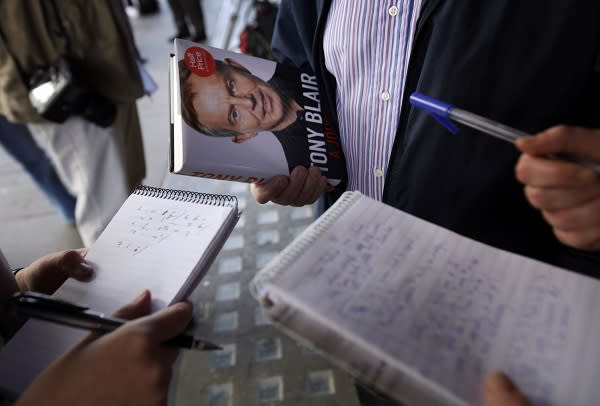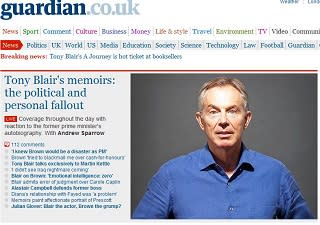 The Upshot
The UpshotTony Blair memoir dominates British press

Tony Blair has been out of the prime minister's office for over three years, but it'd be hard to tell from scanning the British press on Wednesday. Newspaper headlines touched on 8-year-old debates — such as the question of committing U.K. troops to the invasion of Iraq — along with Blair's impact on the Labour Party. Blair, whose memoir, "A Journey," hit shelves in the morning, dredged up old controversies while driving media coverage all day.
Toby Harnden, the Daily Telegraph's U.S. editor, told The Upshot that it's "absolutely saturation coverage" across the pond.
So why's Blair such a hot topic?
Matt Frei, the anchor of BBC America's "BBC World News America," told The Upshot that Blair is "one of the giants of modern British politics" yet remains "a bit of an enigma." The public, he said, wants to know how Blair — elected as head of Labour, a party with socialist roots — pushed for more conservative economic policies and later became such a close ally of Republican former President George W. Bush.
"What we want to know about his political love affair with George Bush," Frei said. "How did that happen? What were they thinking?"

Both Frei and Harnden point out that interest in Blair's book is especially acute because the former prime minister wrote not just on policy matters, but on personal relationships that have long captivated the British press and public. In addition to granting readers a behind-the-scenes view of his dealings with Bush, Blair also provided plenty of background on his fractious relationship Gordon Brown, his political rival and successor as Labour Party leader and prime minister.
"The British press, maybe more than American, is very interested in personalities and gossip," Harnden said, adding that any new details about Blair's relationships with major figures will get major play. (Some of these accounts, especially those concerning top aide and spin doctor Alastair Campbell, the subject of the scabrous BBC political satire "The Thick of It," also are yielding ample attention in the British press, but comparatively less in the States.)
Blair is candid in his criticism of Brown, which makes compelling reading. Most political memoirs, Frei said, are usually "toxic," "boring" and the type of "Christmas present that people use as a paperweight or to swat a fly." But Blair opened up on some personal issues that Frei said the prime minister didn't want to touch during a few interviews he conducted with Blair since leaving office.
As many British journalists pored through the memoir, a few also questioned Blair himself on what's covered in the book. Both the Guardian and the BBC interviewed Blair, as did ABC News' Christiane Amanpour. (Part of Amanpour's interview airs Wednesday on "World News," with the full version on Sunday's "This Week.")

Major British newspapers like the Telegraph and Times of London ran several pieces of news and analysis — the latter even offering a "60-second version" of the tome in the form of video commentary.
But the Guardian newspaper may be leading the pack in terms of saturation. On Wednesday afternoon, the top five politics stories on the Guardian's website were all Blair-related. That included a live-blog of the book (and related media coverage) by senior political correspondent Andrew Sparrow. He started live-blogging at 7:30 a.m. — shortly before picking up the 718-page book from publisher Random House—and continued for more than 12 hours.
Blair's public approval dropped significantly through his tenure, and yet the public can't seem to get enough of Blair-related stories now. Indeed, Blair's memoir, the AP notes, "provides plenty of fodder for the former British leader's supporters — and detractors." Here are just a few of the hot topics and characters getting attention so far:
Iraq: Blair says he doesn't regret supporting the invasion of Iraq, the decision that has most tarnished his legacy at home. He writes that leaving Saddam Hussein in power presented a larger risk to security in the world than removing him. Still, Blair admits to regretting "with every fiber of my being the loss of those who died."
Gordon Brown: Blair says that Gordon Brown, his Labour Party partner and successor at 10 Downing Street, had "zero" emotional intelligence and was "strange guy". Given such liabilities, Blair now says that he believed Brown "was going to be a disaster" as leader.
George W. Bush: By standing by President Bush — a hugely unpopular figure in the U.K. during the Iraq war — Blair was pegged by critics and the press at home as "Bush's poodle." Blair, then and now, remains a fan of the 43rd president. "I was asked recently which of the political leaders I had met had most integrity: I listed George near the top," Blair says. He also described Bush as "a true idealist."
Princess Diana: Blair describes Princess Diana as an "extremely captivating" woman. But, he adds in a quote getting big play: "We were both, in our own way, manipulators — good at grasping the feelings of others and instinctively playing on them." Blair recalls preparing his famous "People's Princess" eulogy with Campbell, and he discusses the royal family's early reluctance to make a statement.
Rupert Murdoch: The conservative media mogul showed he was willing to put business interests before ideology when his traditionally Tory-backing papers endorsed Blair in the 1997 campaign. Blair says that he has known the mogul for several years, but Murdoch still strikes him as "an enigma." But that's not necessarily a bad thing. Blair writes: "In the end — and and I'm aware of the shrieks of disbelief as I write this — I came to have a grudging respect and even liking for him."
Now that Blair has looked back fondly on Bush, perhaps the former president will return the favor in a memoir that's hotly anticipated by the U.S. media. Bush's book hits shelves Nov. 9.
(Photo of journalists interviewing man after buying Blair book in central London: AP/ Lefteris Pitarakis)

